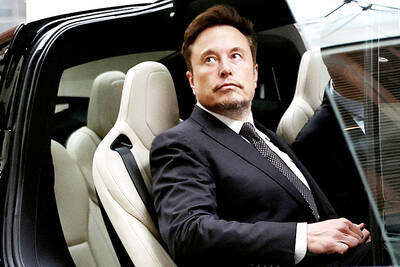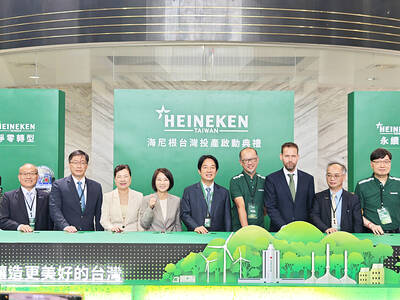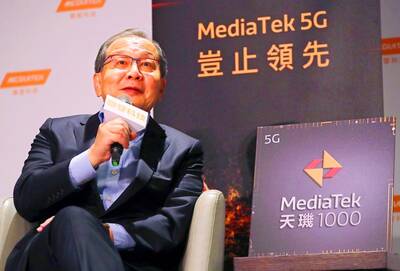Machinery exports fell 1.8 percent year-on-year to US$6.74 billion last quarter as global economic activity remained tepid and companies were conservative about capital spending, the Taiwan Association of Machinery Industry said yesterday.
The struggle among local machinery manufacturers to resume growth momentum continued amid macroeconomic headwinds at a time when overseas sales in other sectors lifted overall exports 12.9 percent year-on-year to US$110.33 billion in the first quarter, Ministry of Finance data released on Wednesday showed.
However, rising demand for high-performance computers and artificial intelligence applications, as well as for advanced technologies to reduce carbon emissions and achieve digital transformation, are expected to support investment momentum in the manufacturing sector and enable machinery exports to gradually resume growth in the next few quarters, the association said in a report.

Photo: Ritchie B. Tongo, EPA-EFE
Taiwan’s major machinery exports comprise mainly machine tools, inspection and testing equipment, and electronic equipment, which respectively accounted for 7.9 percent, 16.8 percent and 15.4 percent of overall machinery exports in the first quarter, the report said.
In the January-to-March period, machine tool exports declined 10 percent annually to US$531 million, overseas shipments of inspection and testing equipment rose 3.4 percent to US$1.13 billion and electronic equipment increased 3.4 percent to US$1.04 billion, it said.
The US and China were the two largest buyers of Taiwanese machinery in the first quarter, at US$1.65 billion and US$1.55 billion respectively, followed by Japan, with purchases totaling US$524 million, it said.
Purchases from the US, China and Japan accounted for 24.5 percent, 22.9 percent and 7.8 percent respectively of Taiwan’s total machinery exports in the quarter, it added.
The Chinese market is likely to recover gradually, judging by firms’ participation at the China CNC Machine Tool Fair in Shanghai this week, the association said.
However, local machinery makers are still cautious about their business this month, with 33.9 percent of association members expecting an increase in orders and 45 percent expecting no change, it said.

Huawei Technologies Co’s (華為) latest smartphones carry a version of the advanced made-in-China processor it revealed last year, results from an independent analysis showed. This underscored the Chinese company’s ability to sustain production of the controversial chip. The Pura 70 series unveiled last week sports the Kirin 9010 processor, research firm TechInsights found during a teardown of the device. This is a newer version of the Kirin 9000s, made by Semiconductor Manufacturing International Corp (SMIC, 中芯) for the Mate 60 Pro, which had alarmed officials in Washington who thought a 7-nanometer chip was beyond China’s capabilities. Huawei has enjoyed a resurgence since

purpose: Tesla’s CEO sought to meet senior Chinese officials to discuss the rollout of its ‘full self-driving’ software in China and approval to transfer data they had collected Tesla Inc CEO Elon Musk arrived in Beijing yesterday on an unannounced visit, where he is expected to meet senior officials to discuss the rollout of "full self-driving" (FSD) software and permission to transfer data overseas, according to a person with knowledge of the matter. Chinese state media reported that he met Premier Li Qiang (李強) in Beijing, during which Li told Musk that Tesla's development in China could be regarded as a successful example of US-China economic and trade cooperation. Musk confirmed his meeting with the premier yesterday with a post on social media platform X. "Honored to meet with Premier Li

Dutch brewing company Heineken NV on Friday announced an investment of NT$13.5 billion (US$414.62 million) over the next five years in Taiwan. The first multinational brewing company to operate in Taiwan, Heineken made the statement at a ceremony held at its brewery in Pingtung County. It also outlined its efforts to make the brewery “net zero” by 2030. Heineken has been in the Taiwanese market for 20 years, Heineken Taiwan managing director Jeff Wu (吳建甫) said. With strong support from local consumers, the Dutch brewery decided to transition from sales to manufacturing in the country, Wu said. Heineken assumed majority ownership and management rights

GROWTH DRIVERS: The firm expects to benefit from generative AI applications for smartphones, higher average selling price of flagship chips and market share gains Smartphone chip designer MediaTek Inc (聯發科) yesterday said it estimates that revenue would expand at an annual rate of about 15 percent this year, as a proliferation of generative artificial intelligence (AI) applications for premium smartphones are fueling demand for its flagship smartphone chips. It expects its smartphone chip revenue to outgrow the company’s average growth rate this year, benefiting primarily from the higher average selling price of its flagship smartphone chips and market share gains. The flagship chip revenue is to soar 50 percent year-on-year this year, MediaTek told an investor conference yesterday. As a whole, this year’s gross margin is